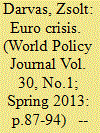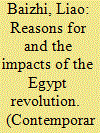|
|
|
Sort Order |
|
|
|
Items / Page
|
|
|
|
|
|
|
| Srl | Item |
| 1 |
ID:
120902


|
|
|
|
|
| Publication |
2013.
|
| Summary/Abstract |
In 2007, a South Korean geologist discovered large deposits of diamonds in Cameroon. To Cameroon, this discovery is particularly significant because it has the potential to engineer sustainable development. Cameroon suffers from acute levels of poverty, high unemployment, devastating levels of corruption, and bad governance. The spoils of diamonds could provide an undeniable avenue to engender sustainable development. However, if history is a guide, the examples of Angola, Sierra Leone, and Democratic Republic of Congo offer instructive lessons of destructive effects of diamond exploration in countries that are contemptuous of good governance and are experiencing lawlessness, economic deprivation, social unrest, and political instability. This essay provides a timely reminder to Cameroon on the consequences of mismanaged natural resources. It explores Cameroon's socioeconomic condition, examines the history of diamond exploration and mining in Cameroon, and analyzes the implications for sustainable development.
|
|
|
|
|
|
|
|
|
|
|
|
|
|
|
|
| 2 |
ID:
119876


|
|
|
|
|
| Publication |
2013.
|
| Summary/Abstract |
Brussels-High unemployment, bleak economic outlook, high public and private debts, dysfunctional banks, weak competitiveness, and an unfavorable external environment are just a few of the challenges facing southern members of the euro zone. Despite these hurdles, the ever-optimistic European Council and other leaders said in January that the euro crisis had bottomed out. Herman Van Rompuy, the president of the European Council, proclaimed, "The worst is behind us, in particular the existential threat to the euro." Then there was Mario Draghi, president of the European Central Bank (ECB), who declared that "the darkest clouds over the euro area [have] subsided."
|
|
|
|
|
|
|
|
|
|
|
|
|
|
|
|
| 3 |
ID:
104231


|
|
|
|
|
| Publication |
2011.
|
| Summary/Abstract |
After Tunisian President Ben Ali fled his country, Hosni Mubarak, Egypt's modern 'pharaoh' and ruler for 30 years, was toppled in just 18 days by a wave of popular protest. There are diverse reasons for his fall. These include economic problems caused by high population growth, high unemployment, and high inflation; social problems caused by the excessive gap between rich and poor; unfair distribution of social wealth; and political problems caused by Mubarak clinging to the presidency and his intention to hand over power to his own son. When the Tunisian revolution occurred, these were the reasons that triggered Mubarak's collapse. However, because Egypt is a regional power, the impacts of its own revolution far exceed those of Tunisia and will inevitably affect not just the region but also US strategy in the Middle East.
|
|
|
|
|
|
|
|
|
|
|
|
|
|
|
|
|
|
|
|
|